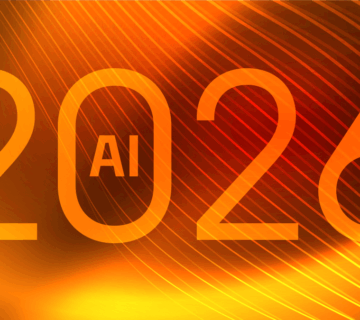AI often creates a dichotomy: for some, it conjures images of machines taking over the world, generating competition for jobs and instilling fear, uncertainty, and doubt. For others, embracing this technology presents an exciting opportunity to adopt new, more efficient, and productive methods to fuel business growth.
Movies like The Terminator, I Robot, and The Matrix can be blamed fair and square for people’s fear of AI. Thanks to these, there is this image of AI as an evil giant out to overpower and ultimately decimate humankind. Admittedly, there is much we still don’t know about AI and the full extent of its powers. However, there is no real reason to panic and assume that we are hurtling towards a dystopic future any time soon. When we choose to adopt a more optimistic view, the realization dawns that AI has immense potential, and the myriad ways in which it can transform lives is mindboggling.
As Uncle Ben, in Spider-Man, very wisely stated, “Remember, with great power comes great responsibility.” This couldn’t be more apt in the AI context, where a universe is full of opportunities waiting to be explored. The key is to adopt a rational, pragmatic approach and leverage AI for good. Yet fears around AI use remain. Instead of dismissing them outright, we should consider debunking these concerns logically. Let’s break down the fears to find out how much truth there is to it and what is exaggerated and mere speculation.
“AI is going to take my job.”
Job displacement is among the most widespread and feared fears. Looking back a few centuries, industrialization triggered similar emotions. Anything that is transformative, groundbreaking, or unprecedented is met with trepidation, fear, and suspicion.
With the introduction of AI, with its high-speed analytical powers, rapid processing speed, and emerging natural language processing capabilities, it is natural to feel threatened. From coding to customer service to even creative jobs such as writing and creating images, AI is offering an alternative to work done by humans.
While the fear seems justified, we need to take a step back and evaluate the reality: at the end of the day, AI is an “artificial” intelligence. It cannot replicate human emotions and is unlikely ever to fathom the depth and range of human experiences.
This is why, despite all the advanced technology, there will always be jobs and roles that humans alone can perform. The complexity of a biological being is not going to be easy to replicate, and while some jobs can be executed by AI, others that are intrinsically dependent on human ingenuity will remain.
Conversely, when AI assumes certain roles, new opportunities will emerge. For instance, as AI takes on repetitive, time-consuming, or low-involvement tasks, humans will ascend the value chain and have the freedom to concentrate on more significant and fulfilling activities. Our quality of life will improve as we learn to embrace, train, and effectively utilize AI to enhance processes and workflows.
Not limited to this, with AI, companies gain the bandwidth to redirect savings toward strategic growth initiatives that includes expanding their workforce or developing specialized AI expertise to drive innovation and competitive advantage.
“AI will drive wrong behavior and perpetuate biases.”
A common concern is that AI may perpetuate wrong ideas and behavior. Since AI models learn from historical data, this is a possibility. If the training data contains discriminatory patterns, AI will learn and reinforce these biases.
There have been instances of biases reported. For instance, AI is known to make biased assumptions, such as depicting senior leaders such as CXO as male or creating images where a person is by default, right-handed. When asked for opinions, results generated often show leanings towards a particular ideology or political thought.
Algorithmic biases also skew AI results. For example, certain attributes may be prioritized by AI based on feature selection. Sampling biases and manually labeled data are other ways the objectivity of the outcome may be compromised.
A possible solution to eliminating this imbalance lies in taking pre-emptive actions. To mitigate the negative impact, training data needs to be made more diverse and inclusive. The datasets need to be rebalanced across demographics. The feedback and correction mechanism must include constant testing, checking and realigning output for greater accuracy. Integrating human oversight is among the most important aspects since humans are the best judges and can provide the best feedback.
Bias can, therefore, not be fully eliminated, but action can be taken to minimize this.
“My data will no longer be personal or confidential anymore.”
Astronomical volumes of data are used in AI modelling and training. The massive swathes of data are collected from millions of interactions and transactions across the net. A valid concern is worry about how the data is being used – especially those around health records, and personal data.
A real concern, discussions and conversations on putting guardrails around data collection and use has been raging ever since AI started. There have been conflicting opinions on the level of restrictions, but all parties agree that controls and checks need to be in place. Especially given that despite best efforts, the possibility of breaches and leaks always exists.
The General Data Protection and Regulation (GDPR) mandates express user consent before collecting personal data. The California Consumer Privacy Act is another landmark act protecting user rights to know what data has been collected, how it is being used and the right to withdraw access to it at any time. The European Union’s AI Act is the world’s first legislation around AI use and is paving the way for the formulation and adoption of similar controls in other regions of the world too. Besides these there are industry specific regulations such as the HIPAA which specifically deals with the healthcare sector. Finance and law enforcement also have defined guidelines.
Individuals therefore need not overly worry about their data since there are bodies protecting their rights. Additionally responsible AI companies use encryption, access control and anonymize collected data as default methods to protect data privacy.
Even as the rules are still being finalized, the need of the hour is for all parties to behave with restraint and responsibility and not resort to unfair measures blindsided by the need to get ahead in the AI race.
“AI is going to take over the world.”
The fear of AI taking over, and the loss of autonomy is an oft-repeated theme in popular fiction. As AI becomes increasingly smarter, sometimes the thought doesn’t seem too far-fetched!
However, unlike the doom and gloom scenarios, it is more likely that AI is going to permeate every aspect of our lives to make it better.
Focusing on the positives, we can expect AI to improve our lives by leaps and bounds. When harnessed correctly, it has the ability to create more equal opportunities, make work smoother, improve our lives allowing us more time and freedom to pursue the thing we like and live more fulfilling lives.
AI is quietly permeating all facets of life. From IoT devices that manage home appliances, to autonomous cars, robotic surgery, transportation, communications, entertainment, and space research, AI is everywhere.
Empowered by internet connectivity, AI can reach the farthest places and dramatically transform lives. Connectivity is a great leveler, enhancing the quality of life and bringing health, education, finance, and opportunities closer home.
Why Smart Businesses Embrace AI
For businesses with a futuristic mindset, real intelligence lies in harnessing AI for its potential instead of fearing its advancement.
Smart businesses embrace AI for its ability to elevate human experiences and enrich lives. With much of its potential yet to be uncovered, for most forward-thinking businesses, it represents an exciting universe of limitless opportunity.
AI is used in almost every product and service we use today, simplifying everyday tasks essential for our well-being, supporting healthier lifestyles, fostering growth, and helping us live fulfilling lives.
The need today is to redirect focus from hypothetical fears and threats to creating control and checks that guide and direct AI power for good – ensuring that people, society and the world benefits from it. The way forward is for us to self-regulate, guided by ethics and rules of fair play as we seek to enrich our lives positively.
At Aprecomm, we use AI to augment human intelligence, experience and expertise to deliver exceptional quality customer experience. Aprecomm offerings are revolutionizing the WiFi experience for millions of users worldwide with seamless, high-quality, disruption-free connectivity.
Demonstrating our commitment to customer data protection, we have secured the SOC 2 and GDPR compliance certifications. These underscore our emphasis on building client trust through responsible data collection and management, while adhering to best data protection practices.
To learn more about the transformative benefits that Aprecomm has generated for service providers using AI, please see the following case studies:
- ACT Fibernet’s ACT SmartWi-Fi® delivers breakthrough customer experience improvements: Early results show better wi-fi performance across all connected devices
- How Aprecomm used AI to help Excitel transform its approach to customer experience
For more information on Aprecomm’s products and services, please contact us at info@aprecomm.ai.
© Aprecomm. All rights reserved. Evolv and the Aprecomm logo, among others, are trademarks or registered trademarks of Aprecomm Private Ltd.









